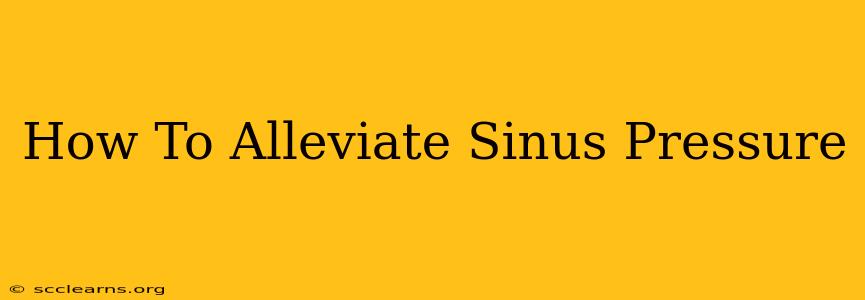Sinus pressure, that agonizing feeling of fullness and pain in your face, can make even the simplest tasks feel overwhelming. Fortunately, there are many ways to alleviate this discomfort, ranging from simple home remedies to medical interventions. This comprehensive guide will explore effective strategies to help you find relief.
Understanding Sinus Pressure
Before diving into solutions, let's briefly understand what causes sinus pressure. Sinus pressure typically arises from inflammation and swelling in the sinuses, air-filled cavities located behind your forehead, cheeks, and nose. This inflammation often stems from:
- Sinusitis (Sinus Infection): A viral, bacterial, or fungal infection leading to mucus buildup and pressure.
- Allergies: Allergens like pollen or pet dander trigger inflammation, causing congestion and pressure.
- Common Cold: Viral infections can inflame the nasal passages and sinuses.
- Nasal Polyps: Noncancerous growths in the nasal passages can obstruct airflow and increase pressure.
- Deviated Septum: A misaligned nasal septum can restrict airflow, contributing to sinus pressure.
- Dental Infections: Infections in the teeth or gums can sometimes spread to the sinuses.
Home Remedies for Sinus Pressure Relief
Many effective home remedies can provide relief from sinus pressure without resorting to medication immediately. These methods focus on improving drainage and reducing inflammation:
1. Saline Nasal Rinse (Neti Pot):
A saline nasal rinse is a highly effective method to flush out mucus and allergens from the nasal passages, relieving congestion and pressure. Ensure you use distilled or sterile water to avoid infection. Follow the instructions on your Neti pot carefully.
2. Steam Inhalation:
The steam from a hot shower or bowl of hot water can help loosen mucus and open up your nasal passages. Add a few drops of eucalyptus or peppermint essential oil to the water for added benefit (but be cautious to avoid burns).
3. Hydration:
Drinking plenty of fluids, especially water, helps thin the mucus, making it easier to drain.
4. Warm Compress:
Applying a warm, damp compress to your forehead or sinuses can help soothe pain and reduce inflammation.
5. Elevating Your Head:
Sleeping with your head elevated on an extra pillow can help improve drainage and reduce pressure.
6. Over-the-Counter (OTC) Medications:
Pain relievers like ibuprofen or acetaminophen can help manage pain associated with sinus pressure. Decongestants, available as nasal sprays or oral medications, can temporarily shrink swollen nasal passages. Always follow the recommended dosage and consult your doctor if you have any concerns.
When to Seek Medical Attention
While home remedies can offer significant relief, it's essential to seek medical attention if your sinus pressure:
- Persists for more than 10 days.
- Is accompanied by a high fever.
- Includes severe facial pain or headache.
- Is accompanied by green or yellow mucus.
- Is accompanied by difficulty breathing.
Your doctor can properly diagnose the underlying cause of your sinus pressure and recommend appropriate treatment, which may include:
- Prescription Medications: Stronger decongestants or antibiotics (if a bacterial infection is present).
- Corticosteroids: Nasal sprays or oral medications to reduce inflammation.
- Surgery: In rare cases, surgery may be necessary to correct structural issues such as a deviated septum or nasal polyps.
Preventing Sinus Pressure
Preventing sinus pressure involves addressing the underlying causes and adopting healthy habits:
- Avoid allergens: Identify and minimize exposure to allergens that trigger your symptoms.
- Maintain good hygiene: Wash your hands frequently to prevent infections.
- Quit smoking: Smoking irritates the nasal passages and increases the risk of sinus infections.
- Manage stress: Stress can weaken the immune system, making you more susceptible to infections.
Conclusion:
Alleviating sinus pressure often requires a multi-faceted approach. By combining home remedies with medical interventions when necessary, you can effectively manage your symptoms and improve your overall well-being. Remember to consult your doctor if your symptoms are severe or persistent. Taking proactive steps to prevent sinus pressure will also contribute to long-term relief.

